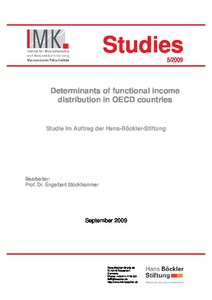Determinants of functional income distribution in OECD countries
"Wage shares have fallen substantially over the past 25 years. In the Euro area the (adjusted) wage share declined by almost ten percentage points. Recently, there has been a renewed interest in the determinants of functional income distribution. IMF (2007a) and EC (2007) find that technologica...
| Main Author: | |
|---|---|
| Institution: | ETUI-European Trade Union Institute |
| Format: | TEXT |
| Language: | English |
| Published: |
Düsseldorf
2009
HBS |
| Subjects: | |
| Online Access: | https://www.labourline.org/KENTIKA-19178369124919965419-Determinants-of-functional-inc.htm |
| Summary: | "Wage shares have fallen substantially over the past 25 years. In the Euro area the (adjusted) wage share declined by almost ten percentage points. Recently, there has been a renewed interest in the determinants of functional income distribution. IMF (2007a) and EC (2007) find that technological change has been the main cause of the decline in the wage share and that globalization has been a secondary cause. This study, firstly, tries to replicate these studies to investigate the robustness of their findings. Secondly, the estimated wage share equation is extended to allow for distributional effects of financial globalization and for different effects of union density according to social security system. We find that the estimations on which the conclusions of IMF and EC are based suffer from serious econometric problems and that their findings are not robust. In particular, the effect of technological change is often not statistically significant. Globalization (in production), however, has a robust effect. Results from the extended model suggest economically important (and mostly statistically significant) effects of financial globalization and of union density of non-Ghent countries. However, overall the results are sensitive to the specification and the estimation method. " |
|---|---|
| Physical Description: | 57 p. Digital |

